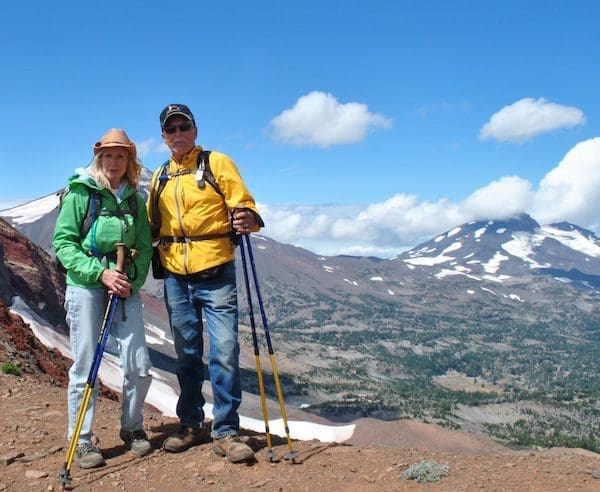Being an obsessive list-maker, if given the assignment to sum up the things Hubby’s cancer taught us about living and dying—and if the assignment required an alphabetized list—it would look something like this (you’re going to need to work with me on a couple of these).

Photo credit: Pixabay
Adversity
It happens. None of us are exempt. But we do get to choose how we live with and beyond the hardship, difficulty, heart-breakingness.
Baldness
After starting chemo, Hubby decided he was going to go bald on his own terms. Our niece was assigned the job of shaving his head. But first, a little fun. First a mohawk. And then an Oregon Ducks “O” sculpted on the back of his head in anticipation of the upcoming Oregon/Oregon State Civil War game. Photos. Facebook postings. This message from Daughter Summer in New Jersey: “What is going on back there?!” Take that, chemo.
Caregiving
The best thing I did as caregiver was come alongside Hubby. Not sitting in the bleachers cheering him on; but in the game alongside him, running interference, picking him up when he got tackled, letting him help me up when I fumbled.
Death
Yes, there are too many sudden, tragic, lonely, senseless deaths. But standing watch as a loved one dies can be a sacred and sweetly sorrowful experience with patient and caregiver surrounded by love, saturated in peace, saying everything that needs to be said.
End-of-Life wishes
Having the discussion about end-of-life wishes before a crisis occurs is wise. As the medical professionals were honest with us about the approach of Hubby’s death and their goal to keep him comfortable, there was a noticeably lighter spirit in my husband.
Faith
Our faith was a critical component that helped us weather the hard road that began with financial reversals. Yes, we struggled with self-pity, frustration, anxiety, and maybe even a bit of anger at God – God, why? Haven’t we served you faithfully all these years? If there hadn’t been a sense of purpose that eventually settled over us, this hard road would have been devastating. And yet it wasn’t. In its place was meaning and deep peace. Because Jesus Christ was central to the equation.
Gratitude
We can count our losses and all that will never be the same. Or we can focus on what remains. Although my husband is gone, the list of what still remains is quite long, beginning with children and grandkidlets and extended family who actually want me around.
Hope
“If you didn’t get your hopes up so high, you wouldn’t be so disappointed,” said the pessimistic, analytical, left-brained man I married. But he changed with cancer. We both carried boatloads of hope during the cancer years.
Ignited
Cancer ignited a passion to live the remaining years of our lives in a way that mattered, and it lit the desire to encourage others to do the same.
Just be
I learned to slow down, set aside my to-do lists, and pick up simple things that could be enjoyed in the same room with the guy in the hospital bed – knitting, a good book, playing Words with Friends (and showing no mercy on the cancer patient). Quite an accomplishment for someone who gets her sense of worth from her accomplishments … pun intended.
Keepsake
A silver chain bearing two small sterling silver dog tags is my most prized piece of jewelry. One tag is engraved with “I love you”; the other is signed with his name, both in Hubby’s chicken scratch handwriting. The tags remind me that I was once loved by a most astonishing, brilliant, kind, selfless, wry-humored man.
Life
It probably should go without saying that we ought to live while we have life. Hubby and I spent the first thirty years of our marriage working and saving for someday. Cancer taught us that someday is now. It prodded us to explore the red canyons of Utah; navigate the New York City subway system; laugh from mountaintops in Oregon, Wyoming, Colorado; drive across Florida’s Alligator Alley; explore the back roads of New England in the fall – while we still had life.

Memorial
I scattered Hubby’s ashes at the top of one of our favorite trails. Ceremony. It’s not simply something we humans invent to mark milestones in our lives; it’s critical for saying the things that need to be said to mark the date, acknowledge the person, say the most important things. Remember this moment, cherish this story, celebrate this life.
Nature
Getting outdoors was instrumental in helping Hubby and me deal with the stress and depression of cancer. There’s nothing like summiting a mountain, or hiking within sound of water rushing over boulders for the ultimate in well-being.
Optimism
Hubby was the analytical sort who first saw all that could go wrong. He liked to refer to himself as a realist. “No, honey, you’re a pessimist.” He’d grin his cute grin and then meet me halfway: “Okay, I’m a realistic pessimist.” (I don’t think there’s such a thing.) When it came to cancer, though, I loved that my realistic pessimist husband faced cancer with optimism.
Proactive
Hubby and I were never interested in sitting back and hoping cancer treatment was all he needed. We were a proactive, engaged team, and even though we were novices, it was the right attitude to carry.
Quality of life
Hubby’s life was extended by several years longer than originally projected, and his quality of life was incredible for someone with a terminal diagnosis. He used to say: “It’s up to me to determine how I’m going to live the rest of my life.”
Risk-taking
Hubby and I put together a tag-team presentation and dared to think there would be audiences across the country who would be interested in our proactive cancer message. Risky. Jim McMahon, former pro football player, says this: “Risk-taking is inherently failure prone. Otherwise, it would be called sure-thing-taking.”
Suffering
I would never wish our wilderness journey on anyone. But I am grateful for the hard lessons learned. I am kinder. More compassionate. With stronger faith. I spend more time noticing the wealth of blessings that make up the every days. This is what suffering and loss did for me, and I like this person better.
Team
It takes a full team to win championships. Not only did we have a full cancer team comprised of good nutrition and stress management and finding meaning, but there was the team of crazy, ridiculously kind, loving people who helped carry our load. I don’t know what we would have done without them.
Unimaginable peace
While I was out on Family Medical Leave, two co-workers came to visit. We chatted, Hubby in his hospital bed, my girlfriends sunk into the sofa. After a while, one of them said, “It’s so peaceful here.” Doesn’t that strike you as odd? We’re sitting in a room with a man dying of cancer and my friends linger long because it’s peaceful. Priceless gift, this peace of God that pervaded our home, our hearts.
Vision
Hubby and I combined our skills and interests and passions and established a non-profit; created a couple of websites – central Oregon trails and nutritional recipes; published a book of cancer heroes. But what happens when a vision dies along with a loved one? Here’s the blazing answer: The vision can be repurposed with a new sense of meaning and destiny to accompany the new season.
Words
“Doesn’t this get monotonous?” Hubby asked one morning after I changed his dressings, drained his bags, flushed his tubes. No, never my darling. Hubby knew I loved living life with him. He knew because I told him. Frequently. And in so many different words. Words are powerful.
Ex-doctors
If your doctor isn’t on your team, it’s time you replaced him/her. Gary and I didn’t hire any of the physicians who didn’t recognize the importance of our cancer team – nutrition, physical activity, stress management, etc.
Yes, thank you.
Hubby’s cancer (and our daughter) taught me to say, Yes, thank you. Family and friends really do want to help ease our load in meaningful ways. “You need to let them,” lectured Daughter Summer. Repeat after me: Yes, thank you.
Zillion
There are a zillion good things that came out of the hard. Like the Porch Fairy, for example. If Hubby hadn’t gotten cancer and if we hadn’t plugged into the local cancer community, I never would have met our Porch Fairy who left Chai tea on our front porch so as not to disturb the patient in the hospital bed in the living room. During the last several weeks of Gary’s life, as my heart was being battered, the Porch Fairy’s daily thoughtfulness extended way beyond delivering hot designer beverages on wintry mornings; it was a loud and clear message that said: I understand cancer is ramping up and it pains my heart to know you’re facing the death of your husband, and if this offering can convey that I’m thinking of you and praying for you and belligerently loving you, well then … Yes, the Chai tea said all that. And that’s just one of a zillion good things.
This thought from Epicurus:
The art of living well and the art of dying well are one.
Which begs the question: What has adversity taught you?
P.S. If you know of others who are as obsessive about lists as I am, please share, tweet or pin!

Kiri Simning
Marlys,
I love reading how you continue to grow and explain to all of us the importance of loving and living fully. Thank you for your years of inspiration! With heartfelt appreciation, Kiri
Marlys Johnson
“The importance of loving and living.” Well said, Kiri. Thank you for reading the blog, and for your kind words.
Mary Kittelson
I love lists too. The funnest thing is crossing things off a list of things to do. Your list is very inspirational and helpful to anyone going through grief/cancer journey. I love the photo of you two. Is that the ridge above the glacial lake on Broken Top? I have many wonderful memories of hiking with you.
Marlys Johnson
Lists. I’ve been known to accomplish a task and then add it to my list for the pure simple pleasure of checking it off! And, yes, Mary, that’s the ridge above the glacial lake on Broken Top – one of our favorite hikes!
Nora Weed
I understand & do a “list” all the time. My husband dated me based on his list of most desirable qualities a partner should have before marriage. I think one thing I would add to your list is not being able to change the inevitable. When my brother Steve was dying, I was so frustrated that I couldn’t change anything but I hung in there and stayed with him until the end. I felt helpless in those finally days but once I accepted what was coming I found peace and a greater love. Steve let me hold his hand until the very end and I am so grateful for that finally connection and touch. So even though feeling “helpless” was part of my journey it was be faced and overcome with tenasicty & love. I love your blog!
Marlys Johnson
Good input and wisdom, Nora — accepting the inevitable and finding “peace and a greater love.” Well said.
P.S. I love the “dating list” idea!